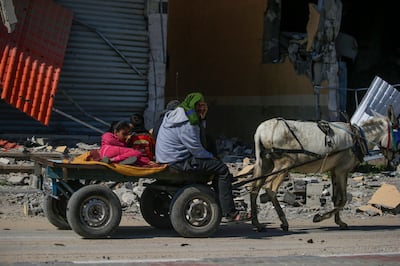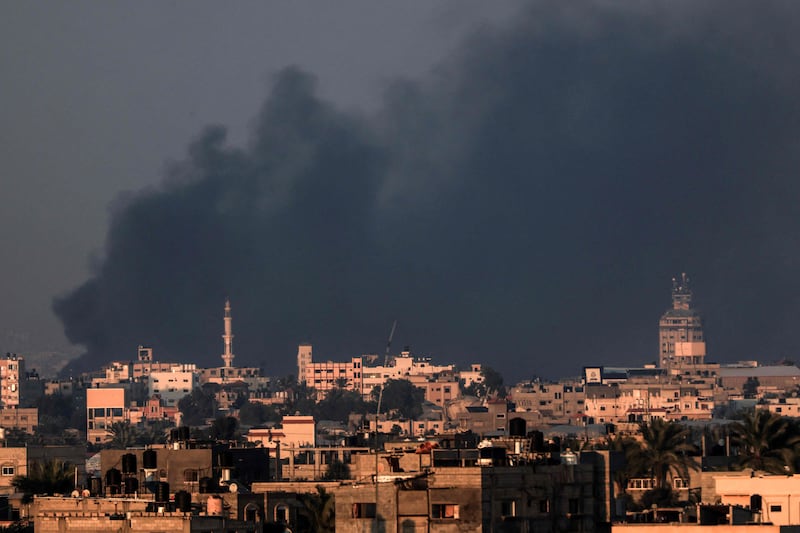Live updates: Follow the latest news on Israel-Gaza
Officials from the US, Qatar, Egypt and Israel are meeting in Doha on Monday to flesh out an “understanding” reached in Paris last week to pause the Gaza war and to discuss postwar mechanisms to run the devastated Palestinian territory.
Sources told The National on Monday that foremost among the postwar plans under discussion would be the formation of an interim Palestinian government made up of non-partisan technocrats to run Gaza and the occupied West Bank when a ceasefire is in place.
That government, they said, will need to win the acceptance of Israel, the US and the international community as the body to oversee the reconstruction of Gaza – devastated by nearly five months of Israeli bombardment.
The proposed government would be in office until legislative and presidential elections are held in Gaza and the occupied West Bank.
On Monday, Palestinian Prime Minister Mohammad Shtayyeh announced the resignation of his government, which rules parts of the West Bank, saying "new political measures" were needed given the changing reality in Gaza.
His resignation, he said, was prompted by "developments related to the aggression against the Gaza Strip and the escalation in the West Bank and Jerusalem".
Delegates in Doha will also discuss details of a detainees-for-hostages swap between Israel and Hamas, as well as laying out the logistics of delivering substantial humanitarian assistance to the enclave when fighting is paused.
The Qatar talks, like previous rounds elsewhere, are being held behind closed doors.

Also on the table in Doha, will be the reconstruction of Gaza and the more immediate task of building a sufficient number of camps to house and care for displaced Palestinians. About 85 per cent of the territory’s 2.3 million residents have fled their homes, due to the fighting.
The Doha talks come a day after US National Security Adviser Jake Sullivan said the Paris talks have yielded an “understanding” of what the hostage and prisoner deal might look like.
“The United States' position in this is clear. We would like to see this deal get done,” Mr Sullivan said.
“We would like to see the hostages returned, including American hostages, and we would like to see a temporary ceasefire which will alleviate the suffering of the people in the Gaza Strip, innocent civilians, women and children.
“So, we are telling everyone, including the Israeli government, that it is our firm position that every effort be exercised to get to this agreement.”
The progress made in truce talks follows what the sources said last week was Hamas’s move to drop its demand for a permanent ceasefire.
Instead, the group accepted a six-week pause on the condition that negotiations to reach a permanent ceasefire begin as soon as soon as the temporary ceasefire is in place, according to the sources.
Hamas has also reduced from 5,000 to 3,000 the number of Palestinians jailed in Israel it wants to be released in return for the hostages held in Gaza since October 7.
It is also showing flexibility on the number of high-profile Palestinian prisoners serving long jail terms that it wants free as part of the exchange, said the sources.

The Israel-Gaza war was sparked by an attack by Hamas on southern Israel on October 7, when its fighters killed around 1,200 people and abducted 240. A week-long pause in the war in late November saw Hamas release more than 100 hostages in exchange for about 200 Palestinian detainees.
It is widely believed that at least 30 of the 130 hostages it currently has have died in captivity.
Israel’s response to the attack has been a devastating military campaign that has to date killed nearly 30,000 people and laid to waste large swathes of built-up areas. The onslaught has also created a massive humanitarian crisis, with many of Gaza’s residents facing hunger and disease.
The Doha talks will be conducted by experts and senior security officials, not the heads of the spy agencies of the US, Egypt and Israel and the Qatari Prime Minister Sheikh Mohammed bin Abdulrahman, as was the case in Paris last week.
The talks, which are expected to continue for three days, will shift to Cairo late this week or early the next, said the sources.
An understanding reached in Paris, however, does not mean that a truce is a done deal, although the sources said Washington appeared determined that one must be in place before the start of the holy Muslim month of Ramadan on March 10 or 11.

Hamas and Israel, for example, remain far apart on several key issues.
Hamas wants Israel to initially redeploy its forces out of built-up areas as a prelude to a complete withdrawal from the coastal enclave. Israel, for its part, is insisting on retaining an indefinite and unfettered security role in Gaza and remains determined to eradicate Hamas.
Israel in the meantime is adamant to take its ground operations to Rafah, the southernmost city in Gaza, on the Egyptian border, and now home to some 1.4 displaced Palestinians.
The US, UN and others, including Egypt, have repeatedly warned against attacking Rafah, arguing that a ground operation there would cause huge civilian casualties.
Israel also wants to maintain buffer zones in east, north and south of Gaza to deny Hamas and other militant groups direct access to its border, thus preventing a repeat of the October 7 attack.
It also has reservations about what it views as the large number of incarcerated Palestinians that Hamas wants to be freed in return for the hostages.
Hamas could also present a hurdle to reaching an enduring settlement of the Gaza conflict, according to the sources, who said peace in the enclave could only be achieved if the group abandons its firm commitment to armed struggle and Gaza's demilitarisation.
Hamas, also, may object to being sidelined until elections are held and, as in the wake of its four previous wars against Israel, will want to publicly celebrate a ceasefire as a victory.
“The mediators don’t want either Israel or Hamas to declare a victory when the war is paused,” said one source.
A non-partisan government in which Hamas is not represented in any way must be a part of the deal to pause the war, added the source.
“The world needs a government other than Hamas’s to handle all the issues that need to be dealt with after the war ends.”
Hamas has ruled Gaza since 2007, when it threw out representatives of the West Bank-based Palestinian Authority in a brief civil war. Differences between the two sides persist to this day despite several reconciliation efforts by Egypt.







